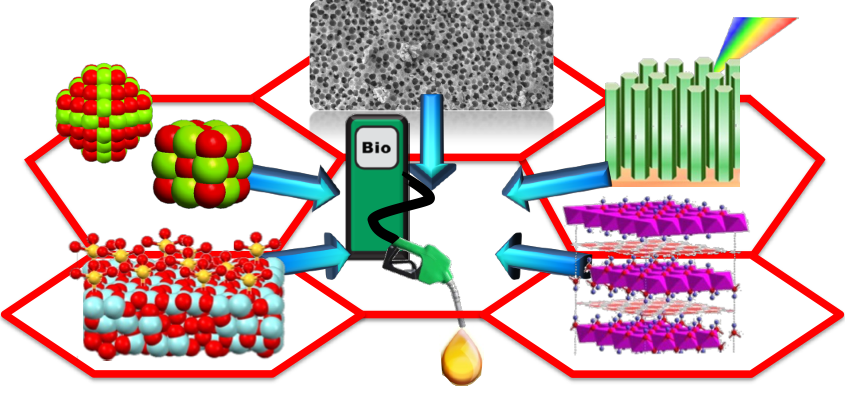This project aims to develop next-generation solid acid catalysts for energy- and atom-efficient transformations of waste biomass and carbon dioxide to sustainable chemicals and fuels.
Project title: Nanostructured catalysts for sustainable chemical manufacturing
Project dates: 2020-2023
Grants and funding: ARC DP200100313
Description
The quest for sustainable resources to meet the demands of a rapidly rising global population while mitigating the risks of rising CO2 emissions and associated climate change, represents a grand challenge for humanity. Biomass offers the most readily implemented and low cost solution for sustainable transportation fuels, and the only non-petroleum route to organic molecules for the manufacture of bulk, fine and speciality chemicals and polymers. [1]
This project aims to develop next-generation solid acid catalysts for energy- and atom-efficient transformations of waste biomass and carbon dioxide to sustainable chemicals and fuels. Catalysis is a transformative technology, key to both life and lifestyle, contributing to 90% of chemical manufacturing processes and >20% of all industrial products, and will be a key enabler for the emerging Australian bioeconomy. The expected development of new high performance catalysts for the production of renewable transportation fuels and sustainable chemical feedstocks will underpin commercially viable low carbon technologies using waste resources, and should provide significant benefits to Australian science, industry, and the environment.
Research strategy
Biorefineries are a new concept in chemical manufacturing to produce sustainable fuels and chemicals from waste biomass and combat climate change.[1] Bio-derived chemicals can be employed as ‘drop-in’ replacements of existing fossil derived chemicals or as new products that may offer enhanced properties for use in high performance materials polymers and coatings. Nanostructured solid acid and base catalysts (Scheme 1) are integral to the design and operation of biorefineries, however existing technologies are inefficient and/or expensive. 2D ZrO2 nanomaterials are particularly attractive solid acid catalysts for biomass valorisation due to their unique electronic properties and catalytic reactivity.[2]
 Scheme 1. Nanostructured catalysts for biomass valorisation to fuels and chemicals.
Scheme 1. Nanostructured catalysts for biomass valorisation to fuels and chemicals.
This project will employ atomic layer deposition to grow multifunctional 2D catalyst films [3] and tune their structural and electronic properties for the production of renewable jet fuels. Sophisticated in-situ ATR-IR and Raman spectroscopies and quantum chemical calculations (in collaboration with the Spanish National Research Council Madrid and University of Milano-Bicocca) will provide unparalleled mechanistic insight and optimise catalyst formulation.
Rationale
This project will provide new cheaper, energy efficient routes to renewable transportation fuels, sustainable chemicals, and high performance materials. The research will be of benefit to the Australian agricultural sector and emerging bioeconomy, stimulating new jobs and commercial opportunities, aligning with National Food Waste and Forest Industry strategies, and contributing to the resilience of Australia’s liquid fuel supply chains. This research will also broadly benefit the environment through the establishment of cleaner routes for chemical manufacture, which will reduce emissions of toxic waste water, atmospheric pollutants and carbon dioxide, directly impacting on quality of life.
Key people
Professors Karen Wilson and Adam Lee
Associated journal publications
- K. Wilson, A.F. Lee, Phil. Trans. R. Soc. A, 2016, 374, 20150081.
- A. Osatiashtiani, A.F. Lee, M. Granollers, D.R. Brown, L. Olivi, G. Morales, J.A. Melero, K. Wilson, ACS Catal. 2015, 5, 4345.
- V. Cremers, R.L. Puurunen, J. Dendooven, Appl. Phys. Rev., 2019, 6, 021302.


